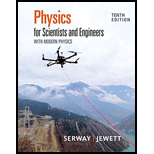
Concept explainers
A liquid has a density ρ. (a) Show that the fractional change in density for a change in temperature ΔT is Δρ/ρ = −β ΔT. (b) What does the negative sign signify? (c) Fresh water has a maximum density of 1.000 0 g/cm3 at 4.0°C. At 10.0°C, its density is 0.999 7 g/cm3. What is β for water over this temperature interval? (d) At 0°C, the density of water is 0.999 9 g/cm3. What is the value for β over the temperature range 0°C to 4.00°C?
(a)
To show: The fraction change in density for a change in temperature is given by
Answer to Problem 35AP
The fraction change in density for a change in temperature is
Explanation of Solution
Given info: The density of the liquid is
The expression for the coefficient of the volume expansion is,
Here,
The formula for the density is,
Here,
Differentiate the above equation with respect to volume.
For very small change in volume and density the expression is,
Substitute
Conclusion:
Therefore, the fraction change in density for a change in temperature is
(b)
The significance of the negative sign.
Answer to Problem 35AP
the negative sign signifies that when the temperature increases, the density decreases.
Explanation of Solution
Given info: The density of the liquid is
The expression for the fraction of the density is,
The negative sign in the above expression shows that as the temperature increases, the density of the water is decreases.
Conclusion:
Therefore, the negative sign signifies that when the temperature increases, the density decreases.
(c)
The value of
Answer to Problem 35AP
The value of
Explanation of Solution
Given info: The density of the liquid is
Recall the equation (1) and rearrange for
Substitute
Conclusion:
Therefore, the value of
(d)
The value of
Answer to Problem 35AP
The value of
Explanation of Solution
Given info: The density of the liquid is
The expression for
Substitute
Conclusion:
Therefore, the value of
Want to see more full solutions like this?
Chapter 18 Solutions
Physics for Scientists and Engineers with Modern Physics
- Page 2 SECTION A Answer ALL questions in Section A [Expect to use one single-sided A4 page for each Section-A sub question.] Question A1 SPA6308 (2024) Consider Minkowski spacetime in Cartesian coordinates th = (t, x, y, z), such that ds² = dt² + dx² + dy² + dz². (a) Consider the vector with components V" = (1,-1,0,0). Determine V and V. V. (b) Consider now the coordinate system x' (u, v, y, z) such that u =t-x, v=t+x. [2 marks] Write down the line element, the metric, the Christoffel symbols and the Riemann curvature tensor in the new coordinates. [See the Appendix of this document.] [5 marks] (c) Determine V", that is, write the object in question A1.a in the coordinate system x'. Verify explicitly that V. V is invariant under the coordinate transformation. Question A2 [5 marks] Suppose that A, is a covector field, and consider the object Fv=AAμ. (a) Show explicitly that F is a tensor, that is, show that it transforms appropriately under a coordinate transformation. [5 marks] (b)…arrow_forwardHow does boiling point of water decreases as the altitude increases?arrow_forwardNo chatgpt pls will upvotearrow_forward
- 14 Z In figure, a closed surface with q=b= 0.4m/ C = 0.6m if the left edge of the closed surface at position X=a, if E is non-uniform and is given by € = (3 + 2x²) ŷ N/C, calculate the (3+2x²) net electric flux leaving the closed surface.arrow_forwardNo chatgpt pls will upvotearrow_forwardsuggest a reason ultrasound cleaning is better than cleaning by hand?arrow_forward
- Checkpoint 4 The figure shows four orientations of an electric di- pole in an external electric field. Rank the orienta- tions according to (a) the magnitude of the torque on the dipole and (b) the potential energy of the di- pole, greatest first. (1) (2) E (4)arrow_forwardWhat is integrated science. What is fractional distillation What is simple distillationarrow_forward19:39 · C Chegg 1 69% ✓ The compound beam is fixed at Ę and supported by rollers at A and B. There are pins at C and D. Take F=1700 lb. (Figure 1) Figure 800 lb ||-5- F 600 lb بتا D E C BO 10 ft 5 ft 4 ft-—— 6 ft — 5 ft- Solved Part A The compound beam is fixed at E and... Hình ảnh có thể có bản quyền. Tìm hiểu thêm Problem A-12 % Chia sẻ kip 800 lb Truy cập ) D Lưu of C 600 lb |-sa+ 10ft 5ft 4ft6ft D E 5 ft- Trying Cheaa Những kết quả này có hữu ích không? There are pins at C and D To F-1200 Egue!) Chegg Solved The compound b... Có Không ☑ ||| Chegg 10 וחarrow_forward
 Principles of Physics: A Calculus-Based TextPhysicsISBN:9781133104261Author:Raymond A. Serway, John W. JewettPublisher:Cengage Learning
Principles of Physics: A Calculus-Based TextPhysicsISBN:9781133104261Author:Raymond A. Serway, John W. JewettPublisher:Cengage Learning Physics for Scientists and Engineers, Technology ...PhysicsISBN:9781305116399Author:Raymond A. Serway, John W. JewettPublisher:Cengage Learning
Physics for Scientists and Engineers, Technology ...PhysicsISBN:9781305116399Author:Raymond A. Serway, John W. JewettPublisher:Cengage Learning
 Physics for Scientists and Engineers: Foundations...PhysicsISBN:9781133939146Author:Katz, Debora M.Publisher:Cengage Learning
Physics for Scientists and Engineers: Foundations...PhysicsISBN:9781133939146Author:Katz, Debora M.Publisher:Cengage Learning An Introduction to Physical SciencePhysicsISBN:9781305079137Author:James Shipman, Jerry D. Wilson, Charles A. Higgins, Omar TorresPublisher:Cengage Learning
An Introduction to Physical SciencePhysicsISBN:9781305079137Author:James Shipman, Jerry D. Wilson, Charles A. Higgins, Omar TorresPublisher:Cengage Learning College PhysicsPhysicsISBN:9781285737027Author:Raymond A. Serway, Chris VuillePublisher:Cengage Learning
College PhysicsPhysicsISBN:9781285737027Author:Raymond A. Serway, Chris VuillePublisher:Cengage Learning





